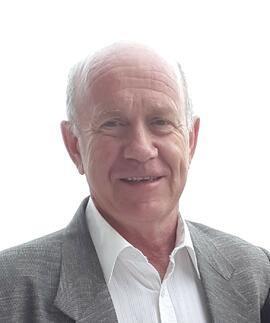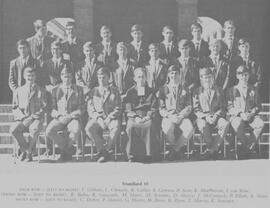Interview with Peter Scott- 1970
Peter came to St David’s in 1969 as a day boy having moved up from Durban where he had
attended Northlands Boys’ High and had been streamed to study Maths.
Peter had an interview with Br Anthony who made a place for him. Peter’s father was employed
by Barclays Bank as was Angus Band’s father and Peter spent a week’s holiday with Angus
before starting at Marist Inanda. It was quite a change coming from a government school into a
private one, he was no longer just a number, everyone knew you and Peter enjoyed the
friendship and the smaller classes; for Biology there only 8 of them in a class.
Peter recalled that Br Anthony was a wonderful man whom he respected, he was strict but fair.
He had a saying that all roads lead to Damelin and as a form of discipline every time a boy
committed a misdemeanour he would first add their name to a transfer card. Next would come
the address and so on until the card was complete and the boy was then out of St David’s.
Br Timothy taught Biology in a didactic manner; Br Bosco (Mario) Science, he was a great
teacher who gave classes after school for the more advanced pupils. Br Patrick – English; Br
Andrew (Drac) who was very strict; Br Michael – Maths and Mr Kalifi, an electrical engineer
turned teacher who taught Maths and Applied Maths. Lex Fernhead was the Biology teacher in
standard 9 and taught the boys as if they were at university level. He gained a Phd, ran the
Durban aquarium and then started the Two Oceans in Cape Town.
Fellow pupils were Kevin McPherson who became an architect, was very good at drawing
caricatures and drew one of Br Mario on the blackboard. Peter Elliot, Alec Chemaly (both
cyclists); Keith Shaw who was head boy, now living in Cape Town and involved in tv work
having done an excellent series for the BBC on Mandela. Kim Small, a good ruby player is now
farming in KwaZulu Natal. Peter often works together with another MOB, Greg Boyes-Varley
and Francis Gibbons and he were best man at each other’s wedding and still keep in touch
today.
Peter wore his hair as long as he could, the maximum allowed, which led Br Anthony to
comment at a prize giving – “grow it, you might lose it one day!” In those days the prize giving
was held under the trees on the south side of the school.
Socially the boys would meet up with the girls from Rosebank Convent and Parktown Convent
with the girls coming to the rugby matches. There was also a coffee club on Friday nights at the
Rosebank Catholic church for teenagers aged 14 to 16 with dancing and socialising but no
alcohol. Peter got quite involved with this and used to organise the music until he was in his
second year at university.
On the sporting front Peter was a runner together with John Williams, his best being the 400m,
however Willy Castle was a better runner. He was a member of the 5th team rugby in standard 9
and in the 3rd team in matric. There was a good spirit and Peter enjoyed the rugby, playing
against CBC Boksburg and CBC Springs which was quite a journey taking two or more hours in
the school buses. Peter remembered a controversial match against St John’s, where everyone
believed that the referee was biased and the Marist boys chased the St John’s team up to the
bell tower. St David’s didn’t play against St John’s for a number of years after that incident.
Peter was also a student officer in the cadets. The drill team came second in the
championships. Mrs Moni organised all the uniforms and the boys had to travel standing up so
as not to crease them before the competition.
Peter recalled a weekend in Henley on Klip for school leavers prior to their matric study week.
They were allowed to drink beer and John Moni was rather bleary eyed on the bus trip home.
There was a three week marine biology trip to Chidenguele, Mozambique where the boys had
an amazing time.
Peter participated in the “Business Game” with his team doing well coming second that year
when Michaelhouse won. Other members of the team Kevin Ryan and Richard Collier went to
do well in business.
The matric dance had the theme of Venice and was catered by Fattis and Monis with the after
party held at John Moni’s home.
Academically, Peter did well and achieved 3 distinctions for his JMB matric. He walked away
with all the prizes with the exception of Afrikaans.
After matriculating Peter went to Wits university to study Medicine, delaying his stint in the army
when he did his two years military service as a doctor on the Angolan border and in mission
hospitals in Natal. He studied Medicine and a BSc Hons in Bio Chemistry simultaneously,
graduating in 1978 doing his housemanship at the Johannesburg hospital. He lectured in
Anatomy for a year with Philip Tobias then started his career and did 6 months as a senior
house officer in plastic surgery and then specialised in general surgery and plastic surgery up
until 1986 when he graduated from the Royal College of Surgeons, Edinburgh. He then
underwent 2 years as a consultant at the Johannesburg hospital and began his own private
practice in 1988. He is still heavily involved with teaching and is on the executive committee of
the Association of Plastic and Reconstructive Surgeons of South Africa and is a member of the
world body of plastic surgeons which involves a lot of travelling and teaching.
On a personal level he is interested in archaeology as a result of his friendship with Philip
Tobias and is a keen cyclist. Peter is married with three children, two daughters and a son who
went to St John’s – his wife, who is a teacher chose the schools and Peter selected the doctors!
One of his daughters is likely to follow him into the field of Medicine.
JLE April 2013



